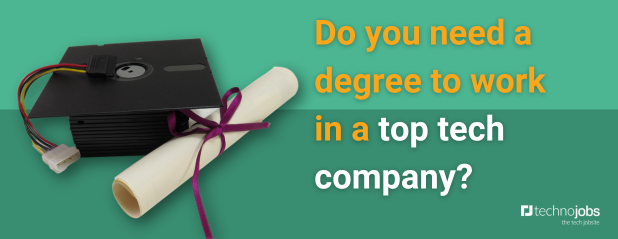Do you need a degree to work in a top tech company?

A degree can be incredibly beneficial in helping you secure your dream role in one of the top tech companies, especially with a Computer Science or similar degree. And it won’t hold your career back at all.
Although you may assume that you need to have a degree to work in the top tech companies, it is not necessarily the case and maybe not as common as you think. Many IT staff do not have a traditional undergraduate degree. Some of the biggest names in the tech world dropped out of university, such as Bill Gates and Mark Zuckerberg. There are many alternative routes and relevant experience and qualifications to ‘make it’ in the tech world.
Here, we will look in a bit more detail on why some people may think a degree is a must and how some professionals can make it to the top tech companies without having one.
One step ahead
Although a degree may not be essential or a requirement for jobs at some of the biggest tech companies, it will likely give you potentially a more structured start in your career. This is because many of the bigger companies offer dedicated technology graduate programmes. With a graduate programme on your CV it may open different and broader career opportunities and may fast track your career potential.
However, other major points a recruiter will take into consideration are your relevant experience in the tech field, as well as other IT qualifications you may have.
Chris Wyatt, a senior consultant from IC Resources believes that a degree is absolutely necessary if you want to land a more specific role with big tech innovators: “If you want to break into AI Software or research, a degree is a must. The state of the market means it’s virtually impossible to get a job without the academic credentials.”
With over five years’ experience in dealing with the recruitment of technical software candidates, Chris explains that online standalone courses are not enough you need a degree especially for competitive and growing ‘new’ industries such as Machine Learning and Artificial Intelligence.
Skills, experience and other qualifications
A degree will only help your chances at securing a role and not hinder it. However, there are other major consideration points that may help sway a recruiter. If you have experience in the relevant field as well as other relevant qualifications you might be more favourable to land a role than someone with just a degree. For example, if you are looking to get into project management and you have relevant qualifications such as PMP or Prince2, then you may stand out more than someone with a general IT degree.
Anthony Sherick, Director of Technojobs commented: “There are so many fantastic opportunities in the tech market – many of the employers will primarily look at your experience rather than a pre-requisite of a degree.
Additionally, there is a real opportunity for those to make a career change into technology later in their career through the hundreds of available online courses, so the degree subject becomes perhaps not as applicable.
With certified qualifications and experience there is a real demand for IT professionals in the market and not having a degree will not hold you back”
Jon Gould the Business Manager at IC Creative added: “In the creative sector, we are seeing a trend towards candidates without the traditional degrees. This means that hiring companies are benefiting from a wider range of potential candidates allowing them to build truly diverse teams with a wider breadth of experience and backgrounds.”
IT jobs degrees
An IT degree can help you get your foot in the door and get started on your career. It can give you a solid starting point. There are a number of IT-related degrees that can help you get started and the following are just some of the degree subjects that you should consider if you’re looking to get into IT.
- Computer Science
- Information Technology
- Information Technology and Information Systems
- Systems & Network Administration
- Data Science
- Information Science
- Software Engineering
- Computer Engineering
- Cybersecurity
- Computing
In conclusion, a degree is likely to give you faster and broader opportunities, but technology is such a broad spectrum, there are a variety of job opportunities available without a degree.
IC Resources is a UK tech recruitment agency with hundreds of opportunities for Graduates and non-Graduates in a number of different sectors. They can provide advice and job opportunities for candidates.
View the IC Resources website here: https://www.ic-resources.com
